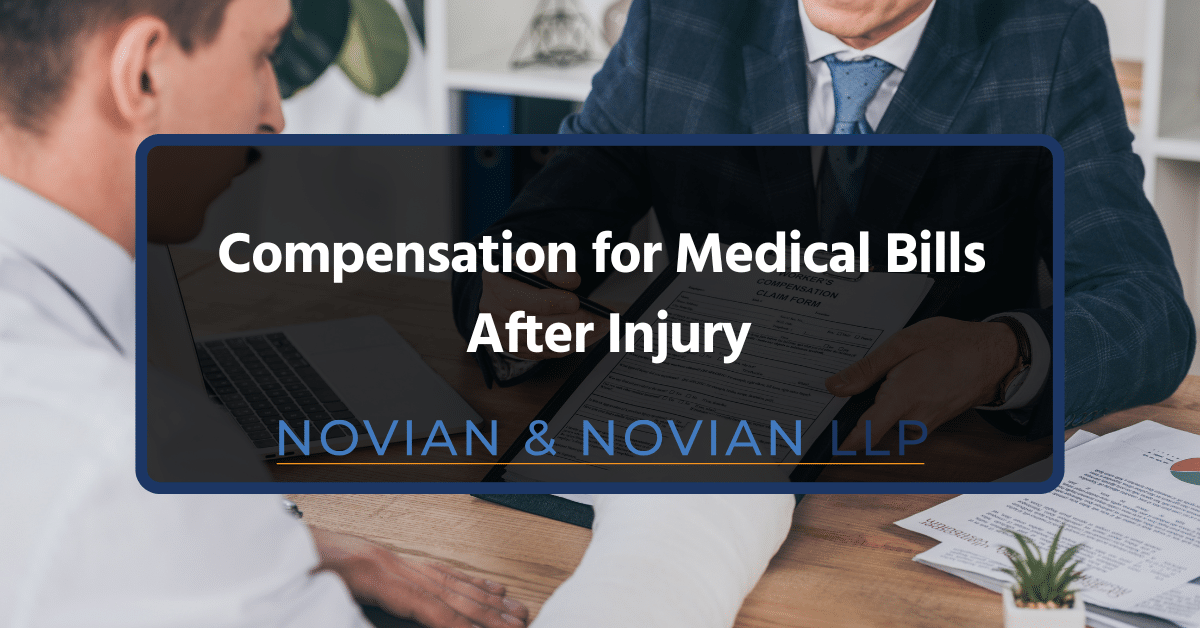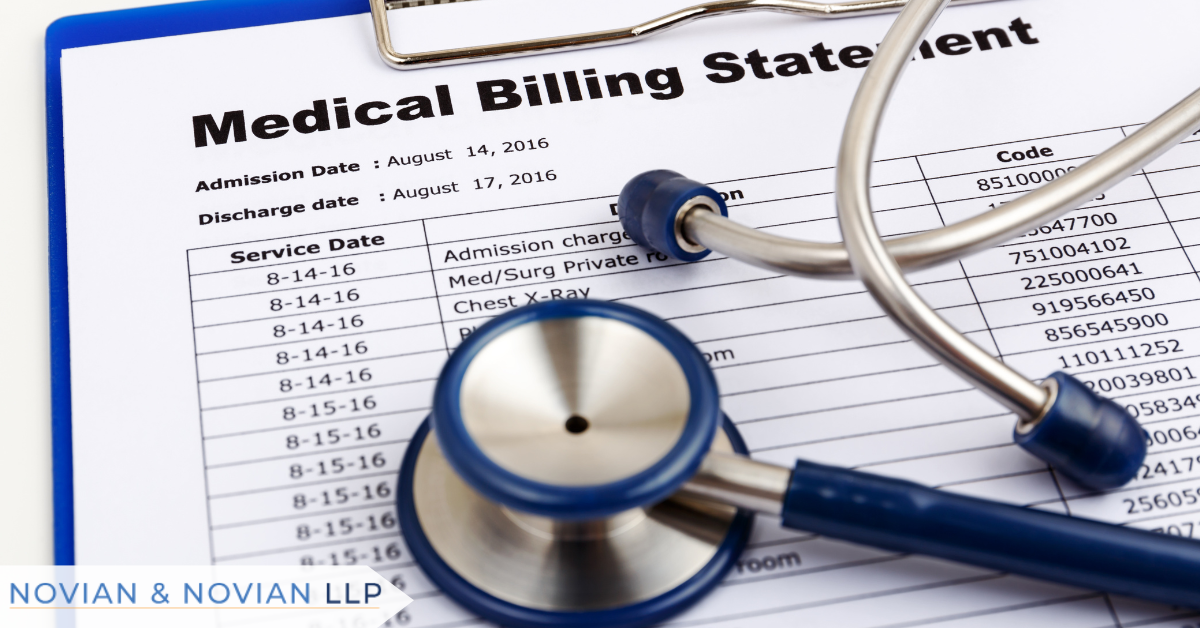The importance of securing full compensation for medical expenses cannot be overstated. The financial strain that follows often leads to long-term instability and emotional distress, especially when injuries result in time away from work or permanent disability.
On average, compensation for medical bills in a personal injury case can range anywhere from $3,000 to $25,000, depending on the type and severity of the injury. However, for more serious and catastrophic injuries such as traumatic brain injuries, spinal cord damage, or severe burns, the cost of treatment can run into the hundreds of thousands or even millions of dollars.
If you or a loved one has suffered a serious injury, you need the help of an experienced legal team. At Novian & Novian, we have over 35 years of experience and a proven track record of handling complex personal injury and catastrophic injury cases. Our team of catastrophic injury lawyers is dedicated to helping victims secure the maximum compensation they deserve for medical bill and holding negligent parties accountable. Contact us today!
This post will cover the compensation you can get for medical bills after an accident. It will also let you know factors that can affect the compensation amount and how to prove your medical expenses.
Table Of Contents
- What Is Compensation for Medical Bills After an Injury?
- How Much Compensation for Medical Bills After Injury?
- What Medical Expenses Are Covered in Personal Injury Cases?
- How Do I Get Compensation for Medical Expenses?
- What Should I Do After an Injury for Compensation?
- Want to Maximize Your Personal Injury Compensation?
- FAQs
- How Long Does It Take to Get Medical Bill Compensation?
- What if Health Insurance Won’t Pay Medical Bills?
- Do I Have to Pay Medical Bills While the Case Is Pending?
- What if I Can’t Afford Medical Treatment While My Case Is Pending?
- What if I Don’t Have Health Insurance?
- Should I Hire a Lawyer for Medical Bill Compensation?
- How Do I Maximize Compensation for Medical Bills?
What Is Compensation for Medical Bills After an Injury?
Compensation for medical bills after an injury refers to the money paid to cover the cost of medical treatment resulting from an incident where another party may be legally responsible. This compensation can come through a personal injury settlement, judgment, or other form of financial recovery designed to reimburse the injured party for both current and future medical expenses.
When someone suffers an injury due to someone else’s negligence or wrongdoing, they are legally entitled to pursue a personal injury claim. A successful personal injury lawsuit or settlement can include compensation for all related medical costs, including emergency room visits, surgical procedures, physical therapy, medication, and ongoing treatment. For many injury victims, this compensation serves as a crucial financial lifeline, helping them pay their medical bills and access the medical treatment they need to recover.
Who Pays the Medical Bills After an Injury?
A common question among accident victims is: Who is responsible for paying the medical bills after an injury? In many personal injury cases, the answer depends on several factors, including insurance coverage, the type of accident, and who is at fault.
Typically, health insurance companies, auto insurance providers, workers’ compensation insurers, or the at-fault party’s liability insurer may be responsible for covering the costs. In cases involving car accidents, personal injury protection (PIP) or medical payments coverage, also known as “med pay,” may apply to help pay your medical expenses up front, regardless of fault.
If an injury occurs on the job, workers’ compensation insurance usually steps in to cover medical expenses and sometimes a portion of lost wages. When another party is deemed responsible for your injuries, such as in a slip-and-fall case or a product liability lawsuit, their insurance company is generally expected to pay through settlement funds or court-awarded damages. However, depending on the circumstances, your private health insurance provider may pay for treatment initially and then recover those costs later through subrogation claims once you receive a personal injury settlement.
In personal injury cases, it is important to understand the difference between economic and non-economic damages. Compensation for medical bills falls under economic damages, which are the measurable financial losses incurred due to the injury. These include not only past and present medical costs, but also future medical expenses that may arise from long-term treatment or permanent disability. Medical providers often submit detailed records to support the calculation of these expenses.
Non-economic damages, on the other hand, are less tangible and include compensation for pain and suffering, emotional distress, and loss of quality of life. While economic damages help pay for your medical costs and related out-of-pocket expenses like co-pays, non-economic damages recognize the broader impact an injury has on your day-to-day living. Together, both types of damages form the basis for a fair settlement in a personal injury case.
Common Types of Injuries Leading to Medical Bills
There are many types of injuries that frequently lead to significant medical expenses and result in personal injury claims. Car accidents, for example, often cause injuries ranging from whiplash and fractures to traumatic brain injuries and spinal cord damage. These injuries usually require emergency care, diagnostic imaging, surgical procedures, and long-term rehabilitation, making medical bill compensation a major part of the settlement amount.
Workplace incidents are another leading cause of injuries that require costly medical treatment. Whether they’re injured from a fall from a height, repetitive strain injury, or exposure to hazardous materials, employees injured on the job are entitled to file claims through workers’ compensation to cover their medical care. Slip-and-fall accidents are also common, especially on commercial or poorly maintained properties.
Furthermore, product liability cases can result in serious injuries, particularly when defective or dangerous products cause harm. These types of claims often involve complex litigation and substantial compensation for medical treatment. In more severe cases, such as those involving traumatic brain injuries, the cost of care can extend for years or even a lifetime. This makes it essential to work with an experienced personal injury attorney who can ensure that future medical expenses are fully accounted for in the settlement proceeds.
How Much Compensation for Medical Bills After Injury?
The compensation you will receive depends on several key factors, but the general rule is that injury victims are entitled to financial recovery for any reasonable and necessary medical expenses caused by someone else’s negligence. This includes both immediate and future medical costs, whether you were hurt in a car accident, a slip and fall, or suffered a serious injury such as a cervical spine injury.
The average personal injury settlement ranges from a few thousand dollars to over $100,000. Minor personal injury cases involving cuts, bruises, or soft tissue damage often receive settlements ranging from $2,000 to $10,000 for medical bills and related costs. For moderate injuries such as broken bones or more intensive physical therapy, compensation may fall between $20,000 and $75,000. In cases involving severe trauma, such as traumatic brain injuries, spinal cord damage, or permanent disability, settlement amounts can easily exceed $100,000, and in some catastrophic cases, medical expenses alone can reach into the millions.
In a typical personal injury claim, compensation for medical expenses includes hospital stays, emergency room visits, surgical procedures, diagnostic tests, rehabilitation, prescription medications, and follow-up care. If the injured party requires long-term care or specialized treatment, those future medical expenses can also be recovered.
Medical payments coverage, often called “med pay,” may be available through your own auto insurance policy, while personal injury protection (PIP) can also help pay medical bills initially, particularly in no-fault states. Health insurance, including private health insurance and government programs, may cover some treatment costs upfront, but insurers often file subrogation claims to recover their payments from your personal injury settlement proceeds.
If you’re curious to calculate your own settlement, try our calculator:
Personal Injury Calculator

What Factors Can Affect the Compensation Amount?
There are several variables that can impact the compensation you receive for your medical bills after an injury. One major factor is the severity of the injury. Generally, more serious injuries result in higher medical costs and therefore justify more money in a personal injury settlement. Injuries requiring extensive surgery, long hospital stays, and prolonged physical therapy typically lead to greater compensation than injuries that heal quickly with minimal treatment.
The length and cost of treatment also play a significant role. A sprain that heals in a few weeks with a single doctor visit will not result in the same settlement funds as a complex fracture that requires months of physical therapy and multiple surgical procedures. Medical providers submit detailed billing records, and your attorney will use these records to argue for a fair settlement that covers all past and future care. If an injury leads to permanent disability, chronic pain, or lifelong care, compensation will also factor in long-term needs, making future medical expenses a critical element in settlement negotiation.
Insurance policy limits can place a cap on how much money is available, especially if the at-fault party has minimal insurance coverage. If this occurs, your own underinsured motorist coverage or health insurance company may step in to help, though this can lead to disputes over who is ultimately responsible for paying. It’s common in these situations for your attorney to manage multiple insurance claims to maximize your recovery and ensure all medical costs are paid. In more complex cases, medical liens may be filed by healthcare providers who have not yet been paid, adding to the financial burden and requiring skilled negotiation to resolve.
Government programs like Medicaid or Medicare can also play a role in covering medical expenses initially, but they often require repayment from any personal injury settlement you receive. This process is known as subrogation, and it must be carefully managed by your legal team to ensure that settlement proceeds are distributed fairly without leaving you with unexpected bills. Co-pays, deductibles, and out-of-pocket expenses are also included in the total amount of medical costs for which you can be reimbursed.
What Medical Expenses Are Covered in Personal Injury Cases?
In a personal injury case, compensation for medical bills can include a wide range of medical expenses, both immediate and long-term. These costs are considered economic damages, meaning they are measurable, documented, and directly related to your injury.
Emergency medical care is typically the first type of expense covered. This includes ambulance rides, emergency room visits, trauma treatment, and other immediate interventions necessary at the time of the injury. For many injury victims, these initial services generate high medical bills right away and form the foundation of a personal injury lawsuit. If the injury is severe, hospital stays may follow. Compensation may then extend to inpatient care, surgical procedures, intensive care unit (ICU) monitoring, and visits from various medical specialists.
Medical tests are another key part of injury-related medical costs. Diagnostic tools such as X-rays, MRIs, CT scans, and blood work help determine the extent of injury and are essential for documenting the need for further treatment. Once stabilized, patients often require follow-up care that involves regular doctor visits. These can include appointments with primary care physicians, specialists like neurologists or orthopedic surgeons, and ongoing consultations to monitor recovery and adjust treatment plans.
Prescription medications are also covered in most personal injury settlements. These may range from short-term pain relievers and antibiotics to long-term medications required for chronic conditions resulting from the injury. For some accident victims, recovery includes physical therapy or rehabilitation, which can last weeks or even months. Compensation may cover occupational therapy, rehabilitation programs, and other services aimed at restoring movement, strength, and quality of life.
In addition to hands-on medical treatment, expenses for medical devices are often recoverable. This may include crutches, orthopedic braces, wheelchairs, prosthetics, and other assistive devices recommended by healthcare providers. If the injured party cannot care for themselves during recovery, home care services may also be covered. These services can involve in-home nursing care or personal care aides who assist with daily tasks such as bathing, dressing, and administering medication.
Mental health treatment is another important aspect of medical compensation in personal injury cases. Psychological trauma is a real and recognized consequence of many injuries, especially those resulting from violent crashes or serious accidents. If a victim is diagnosed with conditions such as anxiety, depression, or post-traumatic stress disorder (PTSD), compensation may include the cost of counseling, therapy sessions, and psychiatric medication when prescribed as part of the recovery process.
Future medical expenses are especially critical in cases involving permanent injury or long-term health complications. If additional surgeries, extended rehabilitation, or recurring treatments are expected, your personal injury attorney will work with medical providers to estimate and include these future medical costs in the settlement amount. Without this foresight, injury victims may be left to pay out-of-pocket for procedures that weren’t anticipated during initial negotiations.
Though not a direct reimbursement for a medical bill, non-economic damages such as pain and suffering often influence the total value of a personal injury settlement. While you cannot submit a receipt for emotional distress or physical discomfort, these factors play a role in determining fair compensation. A skilled attorney can demonstrate how your injury has impacted your daily life, relationships, and emotional well-being, thereby supporting a higher overall settlement that reflects both financial and personal loss.
How Do I Get Compensation for Medical Expenses?
If you’ve been injured due to someone else’s negligence, getting compensation for medical bills is one of the most critical steps in easing your financial burden. In most personal injury cases, the process starts by filing a personal injury claim against the at-fault party. This might be a negligent driver in a car accident, a property owner responsible for a slip and fall, or a company that manufactured a defective product. Through a personal injury lawsuit or settlement negotiation, you can recover medical expenses, lost wages, and other damages.
For car accident-related injuries, you may also turn to your auto insurance policy. Many drivers carry personal injury protection (PIP) or medical payments coverage (MedPay), which can cover your immediate medical bills regardless of who was at fault. These benefits are particularly helpful in the early stages after an accident when treatment costs add up quickly. PIP and MedPay can cover everything from emergency room visits and diagnostic tests to physical therapy and prescription medications.
If the injury occurred on the job, workers’ compensation insurance is the standard route for securing medical expense reimbursement. This system allows you to receive compensation without having to prove fault, though benefits may be limited compared to what you could receive in a third-party personal injury case. In some situations, such as being injured by a contractor or defective equipment on a job site, you may be eligible to file both a workers’ comp claim and a separate third-party insurance claim.
There are also cases where the insurance company refuses to offer a fair settlement or fails to provide enough coverage to pay your medical bills. In those situations, filing a civil lawsuit may be necessary to recover the full cost of your medical care.
A personal injury attorney will guide you through the process, helping you prove your damages, negotiate with the insurance adjuster, or argue your case in court if needed. Settlement proceeds from a successful claim can be used to pay your medical providers, cover future medical expenses, and relieve the financial stress that often follows a serious injury.
How Do I Prove My Medical Expenses?
To secure compensation for medical expenses, it is essential to present strong and organized documentation. First and foremost, keep all your medical bills, insurance statements, receipts, and explanations of benefits (EOBs). These documents provide concrete evidence of how much you’ve spent—or are expected to spend—on medical treatment, and they serve as a foundation for your personal injury claim.
Next, request detailed treatment records from every doctor, hospital, or healthcare provider involved in your care. These records not only verify the cost of treatment but also show the severity of your injuries, the necessity of medical procedures, and the timeline of your recovery. Medical records are crucial when negotiating with the insurance company or arguing for a fair settlement in court.
If your condition requires ongoing or future care, expert medical testimony can be extremely valuable. A qualified healthcare provider can project your future medical expenses, such as long-term physical therapy, surgeries, or in-home nursing care. This kind of testimony is particularly important in cases involving catastrophic injuries or permanent disability, where future costs may significantly exceed your current medical bills.
Maintaining a medical journal is another helpful strategy. Record your symptoms, progress, medications, doctor visits, and the overall impact of the injury on your daily life. This not only strengthens your case for medical reimbursement but also supports non-economic claims like pain and suffering, which may increase your total compensation.
It’s also wise to document any missed appointments, cancellations, or complications that have affected your recovery. These incidents may show how the injury disrupted your ability to receive care and can demonstrate how much effort you’ve made toward recovery. In more severe cases, such records may even illustrate how the injury has interfered with your ability to work, socialize, or care for yourself.
In addition, working with an experienced personal injury attorney can take this burden off your shoulders by building a strong case that includes all your medical expenses, from ambulance rides and surgical procedures to rehabilitation and follow-up care. Your lawyer will gather your medical records, communicate with healthcare providers, and deal with insurance adjusters who may try to undervalue your claim.
What Should I Do After an Injury for Compensation?
If you’ve been injured in an accident, taking the right steps immediately afterward can make a significant difference in your ability to secure compensation for medical expenses and other damages. One of the most important things to do first is to get medical help right away. Even if your injuries seem minor, it’s essential to be evaluated by a healthcare provider. Prompt medical treatment not only protects your health but also creates a critical medical record that documents your condition. These records will serve as a foundation for your personal injury claim.
Next, report the incident to the appropriate authorities. If you were injured in a car accident, you should call the police. If you slipped and fell on someone’s property, you should notify the property owner or manager. In workplace injury cases, you must report the event to your employer as soon as possible. Filing an official report strengthens your case and creates a time-stamped record that connects the injury to the event in question.
Once the situation is under control, gather as much evidence as you can. Take clear photos of the accident scene, your injuries, and any property damage. Collect contact information from witnesses and save any damaged personal items related to the incident. This evidence helps show how the accident occurred and can be instrumental when proving the fault of the other party in a personal injury case or catastrophic injury lawsuit.
It’s also vital to keep every piece of documentation related to your medical treatment. Save all medical bills, receipts, prescriptions, and correspondence with insurance companies or healthcare providers. These documents demonstrate the full extent of your medical expenses and are key to obtaining fair compensation. You should also track every related cost, including travel to appointments, home care services, medications, and any out-of-pocket expenses that wouldn’t have occurred if not for the injury.
During this time, it’s a good idea to avoid posting on social media. Insurance companies and defense attorneys may look at your online activity and attempt to use posts, photos, or even comments to argue that your injuries are not as severe as you claim. Even an innocent post could jeopardize your chances of a fair settlement.
Before speaking to any insurance adjusters, consult with a qualified personal injury lawyer. A legal professional can advise you on your rights, prevent you from making statements that could harm your case, and take over negotiations to ensure that you don’t settle for less than you deserve. An experienced personal injury lawyer will also help you file claims, gather medical records, and deal with insurance companies that may attempt to delay or deny coverage.
Lastly, be sure to follow your prescribed treatment plan closely. Gaps in care, missed appointments, or failure to follow through on recommended treatment can weaken your personal injury claim and reduce the compensation you’re entitled to. Insurance companies often look for signs that an injury victim isn’t taking their recovery seriously. Sticking to the treatment plan demonstrates the legitimacy of your injuries and your commitment to getting better.
Want to Maximize Your Personal Injury Compensation?
Securing the full compensation you deserve after an injury starts with understanding your rights and taking the right steps from the very beginning. Get medical attention as soon as possible, report the incident, and gather evidence to build a strong foundation for your claim. Keep detailed records of every medical bill and treatment, avoid social media pitfalls, and follow through with all doctor-recommended care.
Most importantly, don’t try to navigate this alone. Working with an experienced personal injury attorney can make all the difference in negotiating with insurance companies, proving liability, and pursuing both economic and non-economic damages, such as medical costs and pain and suffering.
You don’t have to bear the financial burden of an accident on your own. At Novian & Novian, we have some of the best personal injury attorneys in California. Our team has helped countless injury victims secure fair settlements. Schedule a free consultation with us today!
FAQs
How Long Does It Take to Get Medical Bill Compensation?
The timeline varies depending on the complexity of your personal injury case, but most settlements take anywhere from a few months to over a year. Cases involving severe injuries or disputed liability may take longer.
What if Health Insurance Won’t Pay Medical Bills?
If your health insurance provider denies coverage, your attorney may negotiate with medical providers to delay payment or accept a medical lien until your case is resolved. You can also pursue compensation directly from the at-fault party’s insurance.
Do I Have to Pay Medical Bills While the Case Is Pending?
Yes, you are generally responsible for your medical bills during the case, but options like MedPay, PIP, or medical liens may allow you to delay payment until settlement. An attorney can help you manage these costs.
What if I Can’t Afford Medical Treatment While My Case Is Pending?
Some doctors and healthcare providers may agree to treat you under a medical lien, meaning they’ll get paid from your settlement later. Your lawyer can also connect you with financing or assistance programs.
What if I Don’t Have Health Insurance?
You can still pursue compensation through a personal injury claim, and many providers will agree to treat you under a lien agreement. A skilled attorney can help you get the care you need without upfront payment.
Should I Hire a Lawyer for Medical Bill Compensation?
Yes, hiring a personal injury lawyer increases your chances of getting full and fair compensation, especially when dealing with large medical expenses or uncooperative insurance companies. They’ll handle negotiations and protect your legal rights.
How Do I Maximize Compensation for Medical Bills?
Follow your treatment plan closely, keep thorough documentation, and work with an experienced attorney to ensure all current and future medical expenses are included in your claim. Avoid early lowball settlements and consult legal counsel before signing anything.




